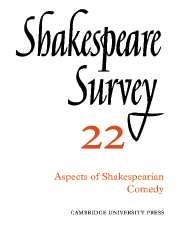Book contents
- Frontmatter
- Old and New Comedy
- An Approach to Shakespearian Comedy
- Shakespeare, Molière, and the Comedy of Ambiguity
- Comic Structure and Tonal Manipulation in Shakespeare and Some Modern Plays
- Laughing with the Audience: ‘The Two Gentlemen of Verona’ and the Popular Tradition
- Shakespearian and Jonsonian Comedy
- Two Magian Comedies: ‘The Tempest’ and ‘The Alchemist’
- ‘Thou that beget’st him that did thee beget’: Transformation in ‘Pericles’ and ‘The Winter’s Tale’
- The Words of Mercury
- Why Does it End Well? Helena, Bertram, and The Sonnets
- Some Dramatic Techniques in ‘The Winter’s Tale’
- Clemency, Will, and Just Cause in ‘Julius Caesar’
- Thomas Bull and other ‘English Instrumentalists’ in Denmark in the 1580s
- Shakespeare in the Early Sydney Theatre
- The Reason Why: The Royal Shakespeare Season 1968
- The Year's Contributions to Shakespearian Study 1 Critical Studies
- 2 Shakespeare’s Life, Times and Stage
- 3 Textual Studies
- Index
- Plate Section
Two Magian Comedies: ‘The Tempest’ and ‘The Alchemist’
Published online by Cambridge University Press: 28 March 2007
- Frontmatter
- Old and New Comedy
- An Approach to Shakespearian Comedy
- Shakespeare, Molière, and the Comedy of Ambiguity
- Comic Structure and Tonal Manipulation in Shakespeare and Some Modern Plays
- Laughing with the Audience: ‘The Two Gentlemen of Verona’ and the Popular Tradition
- Shakespearian and Jonsonian Comedy
- Two Magian Comedies: ‘The Tempest’ and ‘The Alchemist’
- ‘Thou that beget’st him that did thee beget’: Transformation in ‘Pericles’ and ‘The Winter’s Tale’
- The Words of Mercury
- Why Does it End Well? Helena, Bertram, and The Sonnets
- Some Dramatic Techniques in ‘The Winter’s Tale’
- Clemency, Will, and Just Cause in ‘Julius Caesar’
- Thomas Bull and other ‘English Instrumentalists’ in Denmark in the 1580s
- Shakespeare in the Early Sydney Theatre
- The Reason Why: The Royal Shakespeare Season 1968
- The Year's Contributions to Shakespearian Study 1 Critical Studies
- 2 Shakespeare’s Life, Times and Stage
- 3 Textual Studies
- Index
- Plate Section
Summary
If another confrontation between Shakespeare and Jonson is still allowable, then the challenger should be allowed to arm himself with one of his Latin epigraphs. So, on the title-page of Sejanus, the author warns the reader not to look for centaurs or gorgons or harpies; these particular pages will savour of man. The distich is quoted from Martial, an acknowledged kindred spirit ofJonson's, and it seems a curious point of departure for a tragedy, since Martial's epigram (x, iv) had excluded from his life-like pages such monstrous figures as Oedipus and Thyestes. Jonson cut the quotation conveniently short, yet it hints at the limitations that might emerge from a critical comparison of Sejanus or Catiline with Coriolanus or Antony and Cleopatra. For the younger playwright, always more interested in human machinations than in the workings of destiny, tragedy could be reduced to conspiracy. Hence it differed from comedy only to the extent that, in the words of the Prologue to Every Man in His Humour, crimes may differ from follies. That prologue, introducing a revision which shifted the setting from Italy to England, heralds a more realistic drama by condemning the extravagances and ineptitudes of the popular theatre. After casting an invidious glance at such rivals, and appealing for the more judicious laughter of the audience, it concludes by hoping: 'You, that haue so grae'd monsters, may like men'.
- Type
- Chapter
- Information
- Shakespeare Survey , pp. 47 - 58Publisher: Cambridge University PressPrint publication year: 1970
- 1
- Cited by

